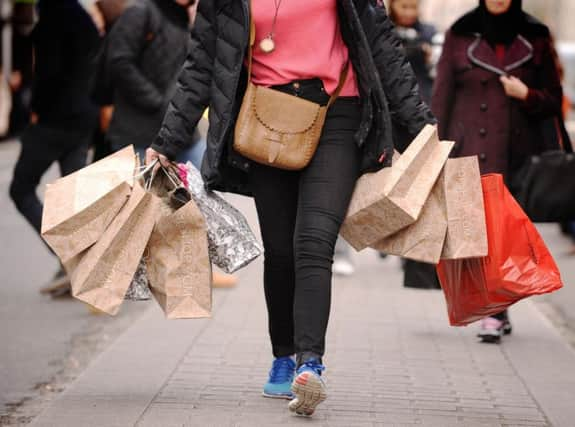Rising cost of clothes and food pushes inflation to two-year high


The Consumer Price Index (CPI) inflation hit a higher-than-expected 1.0% in September - the same level as November 2014 - rising from 0.6% in August.
Economists had been pencilling an increase of 0.9%.
The Office for National Statistics (ONS) said there was “no explicit evidence” that sterling’s slump following the Brexit vote had pushed up prices of consumer goods.
Advertisement
Hide AdAdvertisement
Hide AdThe value of the pound has fallen nearly 20% against the US dollar since Britain voted to leave the European Union.
The Retail Prices Index (RPI) - a separate measure of inflation, which includes housing costs - rose to 2% in September, up from 1.8% in August.
Mike Prestwood, head of inflation at the ONS, said: “CPI inflation has risen to its highest for nearly two years, though it remains low by historic standards.
“The prices paid by manufacturers for raw materials were unchanged over the month and there is no explicit evidence the lower pound is pushing up the prices of everyday consumer goods.”
Advertisement
Hide AdAdvertisement
Hide AdThe main upward pressure on CPI came from a jump in clothing and footwear price tags - especially women’s clothes - with garments rising 6% between August and September, compared a 3.3% rise over the same period last year.
Overall clothing prices rose by 5.5% month-on-month in September.
The ONS said the “relatively large” increase in clothing prices was in line with seasonal trends and not triggered by the drop in the value of the pound following the EU referendum result.
It added that firms had measures in place to protect against short-term changes in the exchange rate.
Advertisement
Hide AdAdvertisement
Hide AdThe cost of living was also impacted by price rises at restaurants and hotels, up 0.7% between August and September compared to 0.2% a year ago.
The cost of an overnight stay in a hotel rose month-on-month in contrast to a fall last year.
Petrol prices climbed by 1.2 pence per litre month-on-month to 111.2 pence, while diesel prices increased by 1.5 pence per litre to 113.3 pence over the period.
However, food prices remained under pressure, dropping 0.3% between August and September, compared with a 0.1% rise last year.
Advertisement
Hide AdAdvertisement
Hide AdPrices at supermarket check-outs have continued to fall as Britain’s Big Four grocers remain engaged in a price war following the rise of German discounters Aldi and Lidl.
Food prices came into sharp focus last week when Tesco and Unilever became locked in a Mexican stand-off over a potential price hike on key products.
Britain’s biggest supermarket was left grappling with a shortage of store cupboard staples - including Marmite, Pot Noodle and Persil - after reportedly refusing to bow to Unilever’s demands for a 10% price rise following the collapse of sterling.
Unilever later said the dispute had been resolved, but warned that consumers would still have to stomach more pain in the new year.
Advertisement
Hide AdAdvertisement
Hide AdThe Bank of England said on Friday that it was willing to allow inflation to run “a bit” higher next year than its 2% target if it safeguarded jobs and boosted economic growth.
Chris Williamson, chief business economist at IHS Markit, said September’s inflation rise was caused by the plunge in the value of the pound.
“UK inflation has risen to its highest for almost two years in a sign that the weak pound is feeding through to increased consumer prices.
“While the ONS found no direct evidence that the pound’s fall has fed through to higher inflation, the link is clear from business surveys.
Advertisement
Hide AdAdvertisement
Hide Ad“The IHS Markit PMI surveys found companies’ costs to have risen at the fastest rate for just over five years in September, with many firms blaming higher import costs resulting from the steep drop in the value of the pound, especially against the US dollar and euro.”
The ONS said that factory gate prices - the cost of manufacturing goods - rose by 1.2% in September 2016, up from a 0.9% rise in the year to August.
Meanwhile, the cost of materials for manufacturers - or input prices - climbed by 7.2% last month, compared to a 6.3% rise the month before.
Andrew Sentance, PwC’s senior economic adviser, said the jump in the cost of living was only the beginning, with further price rises expected in the months ahead.
Advertisement
Hide AdAdvertisement
Hide Ad“This latest rise... is just the tip of the inflationary iceberg which is coming our way.
“Since the beginning of September, sterling has fallen a further 8% or so against the euro and the dollar.
“This will continue to push up inflation in the months ahead. A stronger oil price will add further to price rises for energy and transport.
“Over the course of next year, we should expect inflation to rise above the Bank of England’s 2%. This will squeeze household spending power and add to the slowdown in the economy in 2017.”